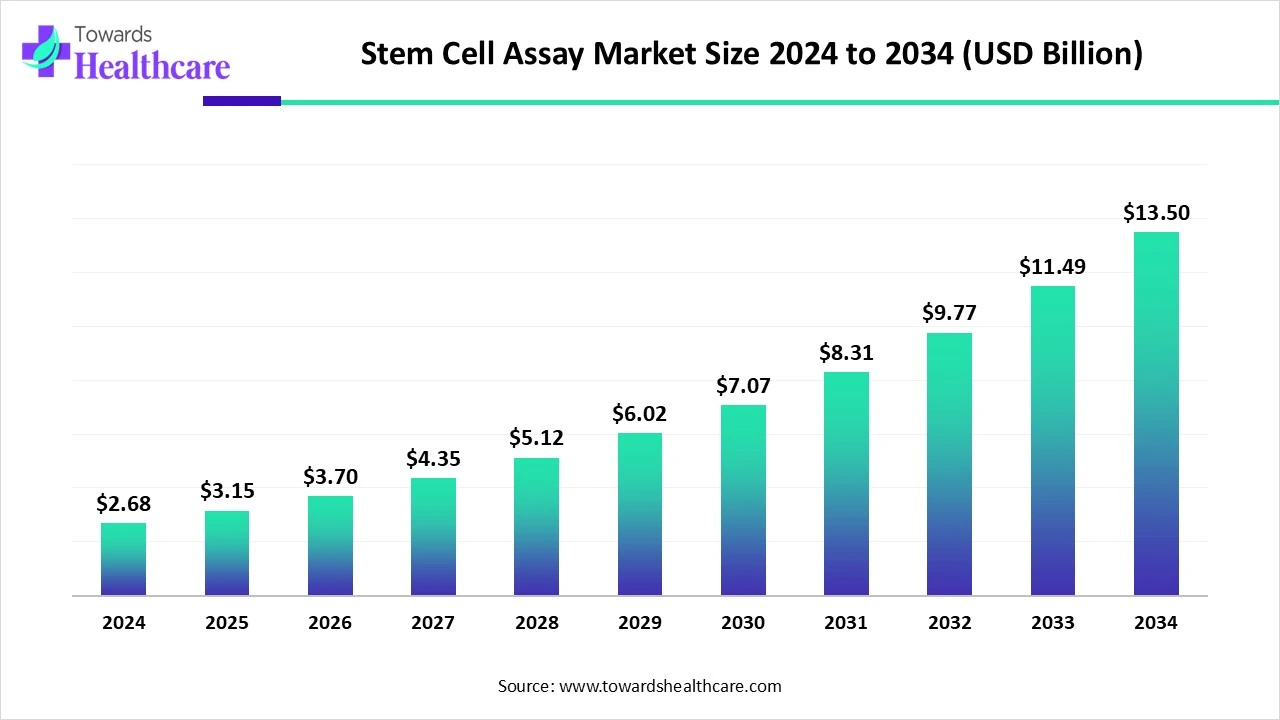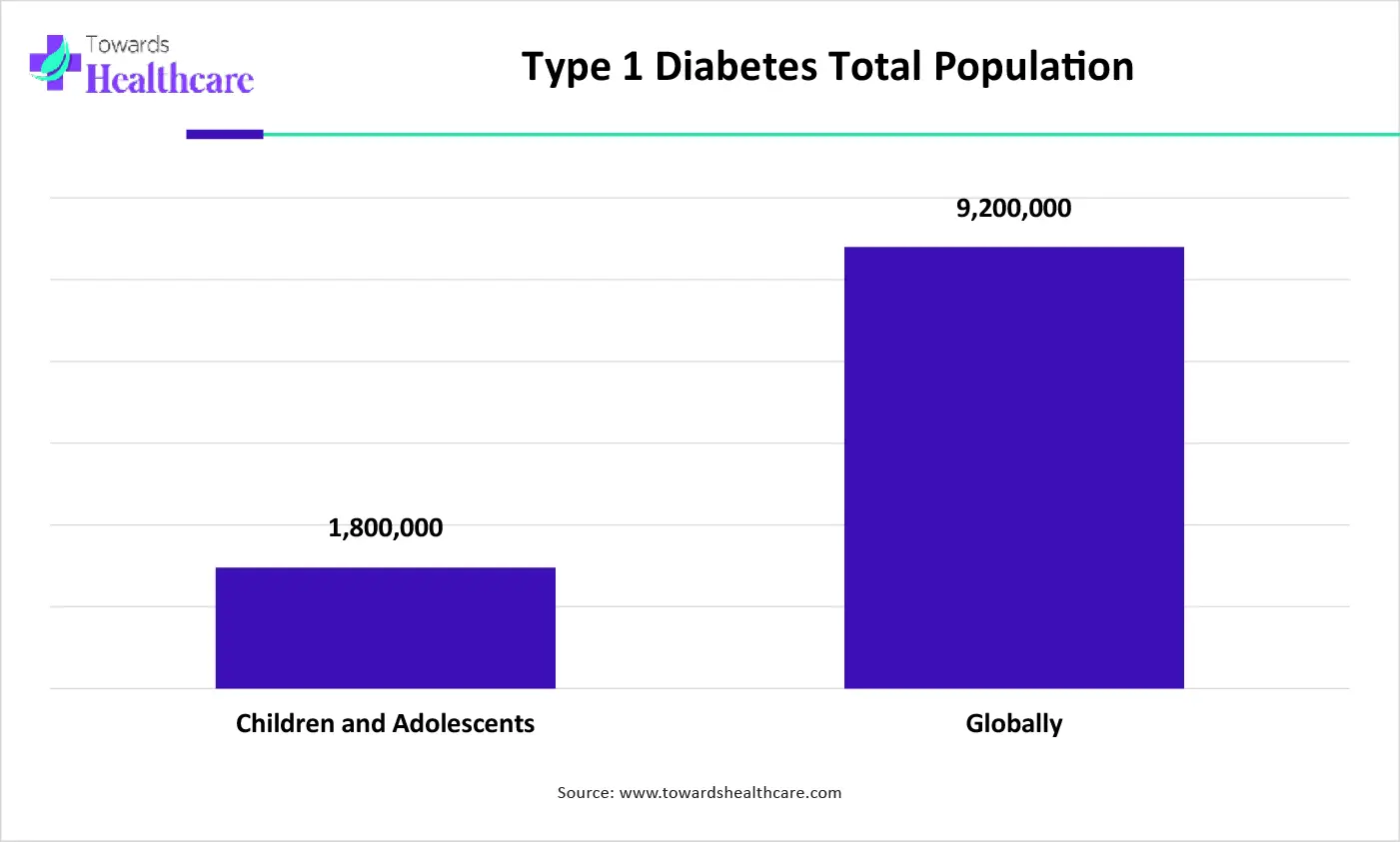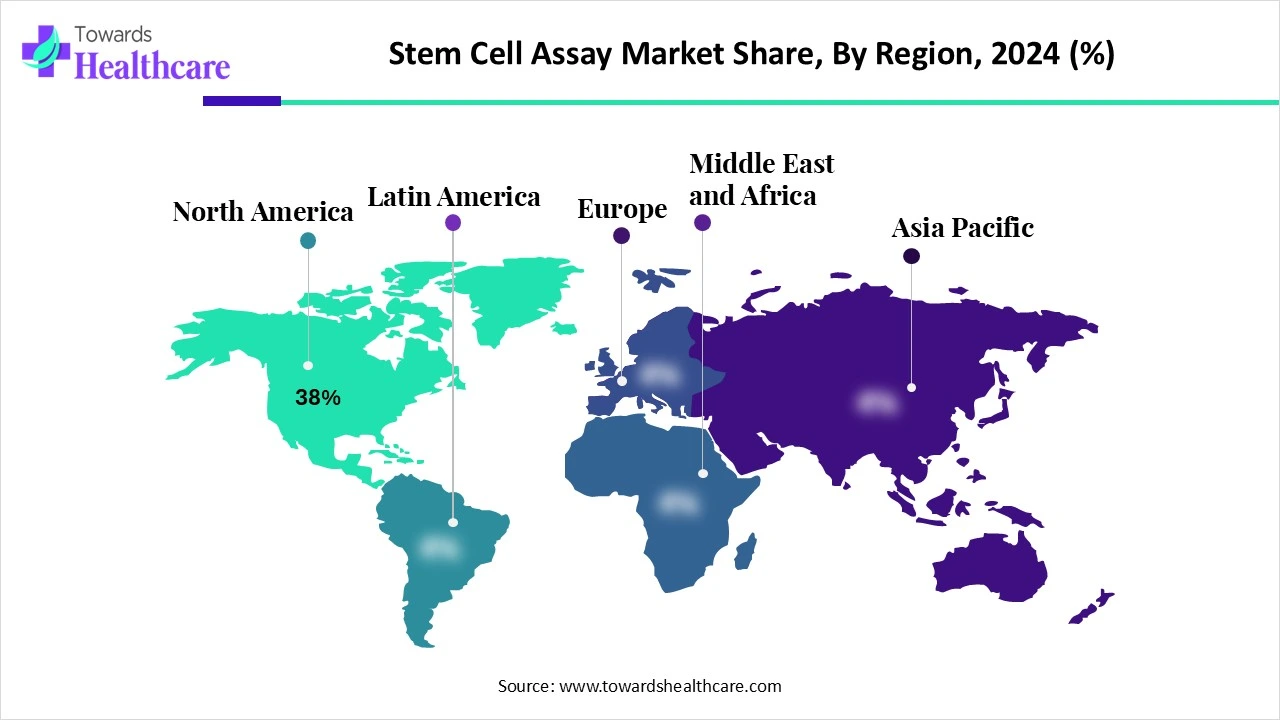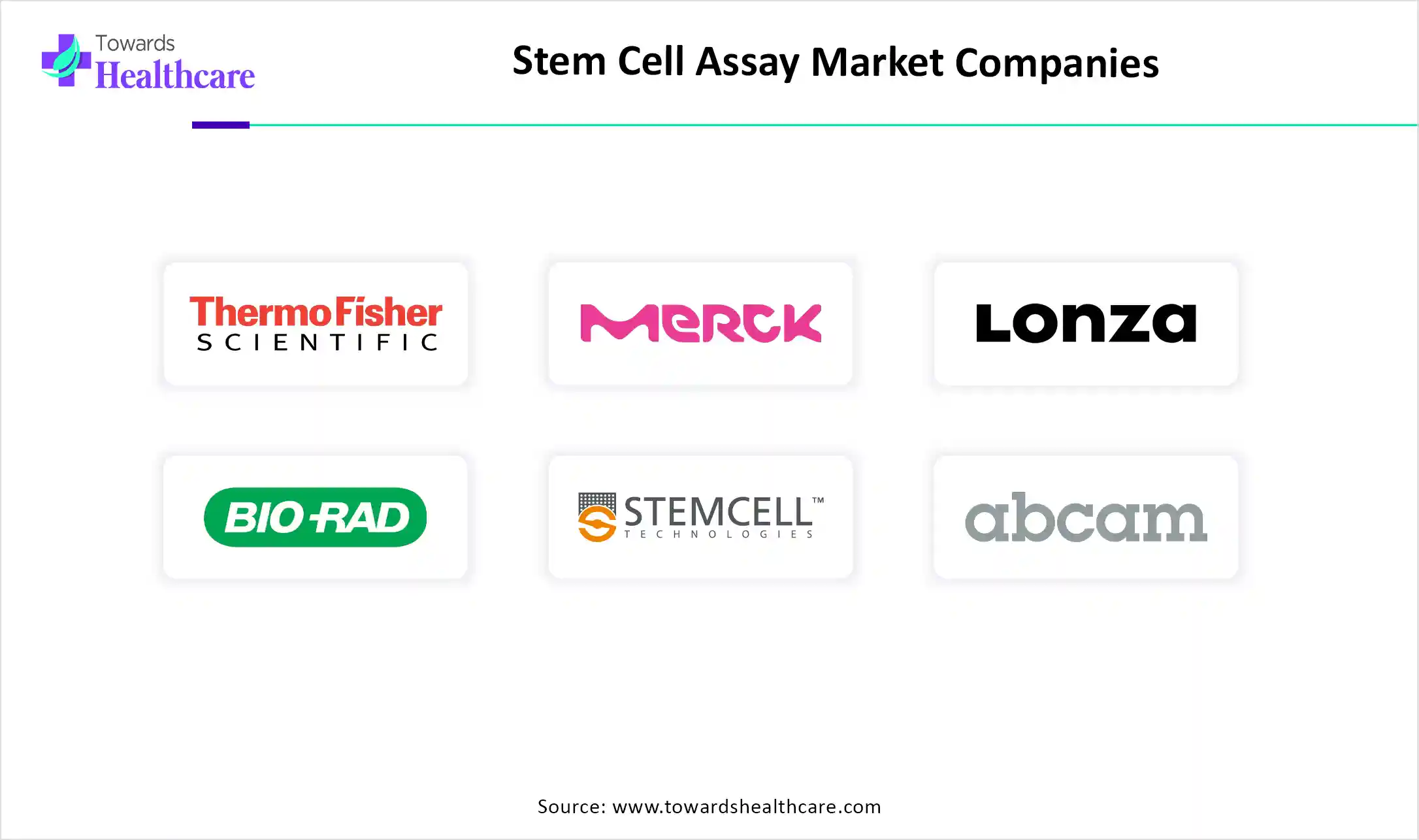January 2026

The global stem cell assay market size is calculated at US$ 2.68 billion in 2024, grew to US$ 3.15 billion in 2025, and is projected to reach around US$ 13.5 billion by 2034. The market is expanding at a CAGR of 17.55% between 2025 and 2034.
The growing research and development, along with the growing drug discoveries and regenerative medicine development, are increasing the use of stem cell assays. At the same time, to enhance its workflow and reduce errors, the use of AI is also increasing. The growing partnerships and product launches are contributing to the same. Furthermore, their demand across various regions is increasing to deal with the growing disease burden due to the growing demand, research advances, and funding. Thus, these advancements are promoting the market growth.

| Metric | Details |
| Market Size in 2025 | USD 3.15 Billion |
| Projected Market Size in 2034 | USD 13.5 Billion |
| CAGR (2025 - 2034) | 17.55% |
| Leading Region | North America share by 38% |
| Market Segmentation | By Product Type, By Assay Type, By Stem Cell Type, By Application, By End Use, By Region |
| Top Key Players | Thermo Fisher Scientific, Merck KGaA (MilliporeSigma), Lonza Group Ltd., Bio-Rad Laboratories, STEMCELL Technologies Inc., BD Biosciences, Abcam plc, PerkinElmer, Inc., Miltenyi Biotec, Bio-Techne Corporation, GE Healthcare (Cytiva), Takara Bio Inc., Agilent Technologies, PromoCell GmbH, Charles River Laboratories, Creative Biolabs, Cyagen Biosciences, Cell Signaling Technology, FujiFilm Wako Chemicals USA, Eppendorf AG |
The stem cell assay market refers to the global market involved in the development, manufacturing, and sales of assays designed to study and analyze stem cells. Stem cell assays are specialized tests used to evaluate the properties, differentiation potential, viability, proliferation, and functionality of stem cells in research, drug discovery, toxicology screening, as well as regenerative medicine. At the same time, assays facilitate understanding of stem cell behavior under various conditions and help in quality control during stem cell-based product development.
The integration of AI in stem cell assays is enhancing the classification and differentiation of stem cells. At the same time, it helps in interpreting the data generated, which can further be used for drug screening and development, along with the development of other therapies. Moreover, AI models that can improve the stem cell potency and predict their behavior by minimizing errors are also being developed. Thus, the AI can enhance and optimize various parameters of the stem cell assay, enhancing its applications.
Growing Stem Cell Research
There is a rise in stem cell research and development to deal with various chronic diseases. This, in turn, is increasing the use of stem cell assays to identify the cell types, as well as their behavior. At the same time, their use in drug discovery is also increasing as it helps in screening the drug effects, monitoring the response of stem cells to the drug, and reducing the chances of failures. Thus, this promotes the stem cell assay market growth.

The graph represents the total number of people living with type 1 diabetes globally. It indicates that there is a rise in cases of type 1 diabetes. Hence, it increases the demand for regenerative medicines for their effective management, increasing the use of stem cell assays for their development. Thus, this in turn will ultimately promote the market growth.
High Cost
For the stem cell assay, the reagents and consumables used are often costly. Moreover, the requirement for advanced equipment also increases the cost of the assay. Additionally, skilled personnel or an expert are required to conduct the assay to enhance the workflow and reduce failures. Thus, all these necessities result in increasing the operational cost, limiting its use.
Increasing Stem Cell-Based Products and Therapies
The use of stem cell-based products, as well as therapies, is increasing, which in turn is enhancing the use of stem cell assays to meet the quality standards of the product developed. It helps in detecting the type of stem cells, their purity and potency, and enhancing their development. They are also being used for the monitoring of the stem cell-based treatment approaches, responses, and safety. Thus, their use is increasing for formulating advanced treatment options, promoting the stem cell assay market growth.
For instance,
By product type, the reagents & kits segment dominated the market with a 55% share in 2024. The reagents & kits were repeatedly used in the stem cell assay. Moreover, due to their advantages, they were used for various research purposes as well as in clinical trials. This, in turn, contributed to the market growth.
By product type, the instruments & equipment segment is expected to show the highest growth at a notable CAGR during the predicted time. The demand for instruments & equipment is increasing due to growing advancements and integration with advanced technologies. At the same time, to enhance their automation and precision, their demand in clinical trials is growing.
By assay type, the cell viability & proliferation segment held a dominating share of 40% in the market in 2024. The cell viability & proliferation were the basic requirements of the stem cell assay. Moreover, it was also used for drug screening and in the development of therapies, as it enhances their safety and quality.
By assay type, the differentiation assays segment is expected to show the highest growth during the forthcoming years. The use of differentiation assays is increasing for the development of therapies. Furthermore, its use in the development of regenerative medicines and drug screening is also increasing.
By stem cell type, the adult stem cells segment held the largest share of 50% in the market in 2024. The use of adult stem cells for the development of various therapies has increased. Moreover, due to their availability and fewer regulatory hurdles, their use was enhanced. This promoted the market growth.
By stem cell type, the induced pluripotent stem cells (iPSCs) segment is expected to show the fastest growth rate during the upcoming years. The iPSCs are mostly being used in the development of regenerative medicines as well as in disease modelling. At the same time, they are helping to amplify the research and development of various stem cell-based therapies.
By application type, the drug discovery & development segment led the market with a 45% share in 2024. The stem cell assay helped in predicting the drug response, as well as its screening, which enhanced the drug discovery & development. Additionally, it was also used to test the drug's safety, efficacy, and toxicity. This enhances the market growth.
By application type, the regenerative medicine segment is expected to show the highest growth during the upcoming years. The growing use of regenerative medicine is increasing the demand for stem cells, as well as stem cell assays to monitor their action. It is also used to detect and enhance the purity and potency of the regenerative medicines developed.
By end user, the academic & research institutes segment led the global market with 40% share in 2024. The academic & research institutes used stem cell assay for the differentiation and proliferation of the products. At the same time, to encourage this development, funding was also provided by the government.
By end user, the pharmaceutical & biotechnology companies segment is expected to show the fastest growth rate during the predicted time. Due to the growing drug and therapy discovery and development, the use of stem cell assays is increasing. Its performance is being enhanced with the use of advanced technologies. New collaborations are also increasing their adoption.

North America dominated the stem cell assay market share by 38% in 2024. The industries, as well as institutes in North America, are well developed. This, in turn, encourages a large number and variety of stem cell research, increasing the use of stem cell assays. Thus, this contributed to the market growth.
The growing developments in the stem cell-based products in the industries of the U.S. are increasing the use of stem cell assays and promoting clinical trials. At the same time, these developments are being supported by the funding provided by the companies, as well as the government.
The industries in Canada are enhancing the development and production of regenerative medicines for the treatment of various diseases. The use of stem cell assays along with advanced technologies is enhancing their development. Moreover, by providing fast approval, the regulatory bodies are providing their support.
Asia Pacific is expected to host the fastest-growing stem cell assay market during the forecast period. As the disease burden in the Asia Pacific is increasing, the demand for the use of regenerative treatment options is increasing. This, in turn, is increasing the use of stem cell assays as well. Thus, this enhances the market growth.
The industries in China are utilizing advanced technologies to accelerate the development and manufacturing of regenerative medicines and therapies. Hence, the use of stem cell assay along with the integration of AI is being used. Moreover, to promote their use, various initiatives are being introduced by the government.
As the diseases increase, the development of various treatment approaches and research is also increasing in India. Thus, for developing enhanced quality and safety regenerative treatment approaches, the adoption of stem cell assays is increasing. Furthermore, the investments provided by various sectors are enhancing their development and clinical trials.
Europe is expected to grow significantly in the stem cell assay market during the forecast period. Europe consists of well-developed industries as well as institutions. Thus, the research conducted with the use of stem cell assays is supported by the funding from various sources. This promotes the market growth.
The industries in Germany are contributing to the increased development of various stem cell-based treatment options. This, in turn, is increasing the number of clinical trials conducted, increasing the use of stem cell assays to monitor the product's effect. These trials are further provided with investments by different companies.
The UK industries and institutes are focusing on the research conducted to enhance the applications of stem cells. Hence, the demand for the use of stem cell assays increases, for understanding their behaviour and differentiating them. Thus, these studies are supported by the government funding.

By Product Type
By Assay Type
By Stem Cell Type
By Application
By End Use
By Region
January 2026
January 2026
January 2026
January 2026